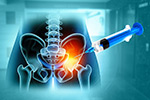
Perhaps you have experienced the flare-up of a nagging joint pain triggered by the onset of winter. For some people the sensation is so finely tuned that they seem to be able to predict weather changes based on the condition of their joints. While there is no clear scientific explanation as to why this is so, most people living with chronic joint disorders, such as arthritis, will agree that there is a link between joint pain and cold weather.
The following are a few possible reasons why cold weather affects joint pain:
- Barometric pressure changes:It is the weight of the atmosphere that is present all around us. Barometric pressures will often fall before cold weather sets in. This causes expansion of tissues and pain in your joints.
- Increased sensitivity of nerves in the joint: In case of injury, the nerves in the joint may become hypersensitive to changes in cold weather due to scarring, inflammation, or adhesions.
- Increasing thickness of joint fluid: In cold weather the synovial fluid which acts as a shock absorber within the joint may become more viscous and not flow freely resulting in stiff and creaking joints.
- A combination of cold & humidity: High levels of humidity and cold weather may be harmful to bone and cartilage cells.
- Inactivity: People tend to move less in freezing weather and long periods of inactivity are detrimental to joint health.
If the cold weather has been worsening your joint pain, the following 5 suggestions may be helpful:
- Pain medications: Consult with your doctor before taking pain medication and strictly follow the instructions given by your doctor regarding the type, dosage, and frequency of use.
- Stay warm: Using electric blankets, keeping your home heated, putting on warm clothing, and thoroughly warming up the car before use are a few things you can do to reduce joint pain.
- Prevent swelling: To keep your joints from swelling, use well-fitting gloves that will keep joint fluid out. Knee bands or braces can be used reduce swelling and improve stability in the knee.
- Stay active: Doing a few stretches and calisthenics will keep your joints limber and strong. As long as you don’t overdo it, staying active will reduce joint pain.
- Keep your spirits up: The cold, dark, and damp weather may have a psychologic effect of reducing your tolerance to pain. Keep your mind engaged with things you enjoy, figure out how to get enough sleep and adequate nutrition. Learning how to improve your mood plays a big role when managing chronic joint pain.
Dr. Domb is a nationally recognized orthopaedic surgeon specializing in sports medicine and arthroscopic surgery of the hip, shoulder and knee. A noted pioneer in advanced new techniques in hip arthroscopy, he delivers innovative treatments for patients with hip injuries such as impingement and labral tears. Dr. Domb is also an expert in arthroscopic surgery of the shoulder and knee, adept in specialized techniques including arthroscopic rotator cuff repair and all-inside ACL reconstruction.





